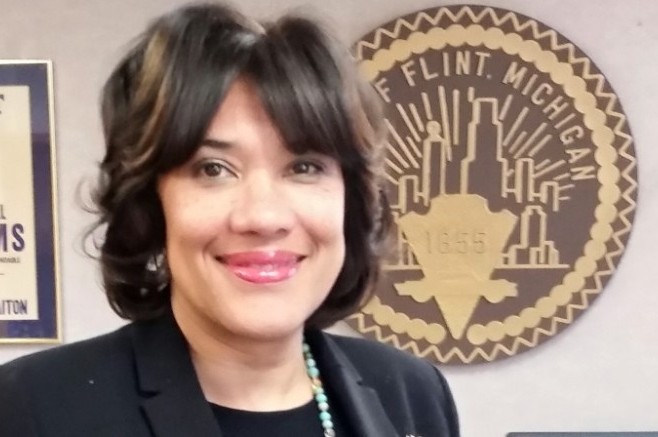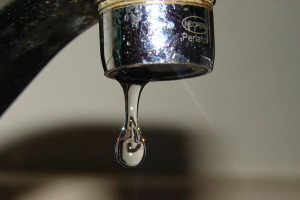Flint water pipe replacement to begin within the next month, officials speculate
Gov. Snyder proposes $195 million budget to help Flint
IMAGE / Courtesy of Flint Mayor’s Office
Dr. Karen Weaver, Flint mayor
Flint’s mayor, Dr. Karen Weaver, spoke at City Hall on Tuesday, Feb. 9, about an estimated $55-million public works project to remove the city’s lead-contaminated pipes from the water distribution system.
After the city’s drinking water became contaminated with lead in April 2014 from a temporary cost-cutting switch to Flint River water, action needed to be done to keep the people of Flint safe.
Weaver has outlined a plan called “Fast Start,” in which the city’s lead pipes will be replaced at no cost to the homeowner.
The plan is speculated to remove up to 15,000 lead pipes in one year in what Weaver said are “optimal conditions.”
The only things that the homeowner needs to do is sign an agreement that allows the city to remove and replace the parts of the lines on their property, along with giving the city access to the meter inside the home.
The lead lines will be replaced with new copper lines. A three-month water filter will also be installed at the kitchen tap as a precaution, according to city officials.
Weaver said that households with pregnant women and children under 6 years old will be the first to receive these new pipes.
“Job one for our city is to remove the lead pipes,” Weaver said. “Until that happens, Flint cannot move forward. Our citizens will not have confidence and trust in the water that comes from their faucets.”
The mayor appointed retired Michigan National Guard Brig. Gen. Michael C.H. McDaniel to head the Flint Action and Sustainability Team, or FAST. This group will coordinate the work between state and federal departments.
McDaniel said the project could begin within the next month, but the plan is currently in its earliest stages. He hopes that work can begin within a week.
“How quickly we can start pulling pipes out of the ground depends on timely approval of the necessary funds, completion of the Fast Start work plan, then ramping up the logistics and field operations,” McDaniel said. “We will continue working diligently to move that process forward.”
According to Weaver, people from the Lansing Board of Water & Light, or BWL, met with the city’s public works staff Monday, Feb. 8, to help move the project forward.
The BWL has experience with removing water pipes, considering it has removed more than 13,000 lead pipes in Lansing in the past 12 years.
Even though it took the BWL years to remove those pipes, McDaniel speculates that pipe-replacement progress will move faster in Flint because the team has perfected the process.
Weaver said the city will work with the Department of Health and Human Services and the medical community to identify at-risk households, but help is needed.
“In order for Flint residents to once again have confidence and trust in the water coming from their faucets, all lead pipes in the city of Flint need to be replaced,” Weaver said. “The success of the Fast Start plan will require coordination between the city, state, and federal officials, as well as funding from the Michigan Legislature, Congress, or both.”
Junior Octavia Brooks lives in Flint and has been going to her grandfather’s house in Mt. Morris to shower and wash clothes.
Brooks believes the water situation could have been prevented, but the Fast Start plan could be a good thing for the city.
“I feel like this is a careless situation that could have been prevented, and I think actions should be taken as soon as possible — not only with passing out water but with replacing the pipes,” Brooks said. “I think it’s (the Fast Start plan) the best idea I’ve heard so far with the water, but it’s sad that the mayor is doing a better job than the governor.”
Weaver is asking for Gov. Rick Snyder to aid these efforts.
“I invite Governor Snyder and his team to pledge their full cooperation to help us get this done,” Weaver said. “And I call on the Legislature and Congress to appropriate the necessary funds so we can get started as soon as possible. The people of Flint have already paid with their lives, health, and quality of life.”
Snyder then, when submitting his annual budget on Wednesday, Feb. 10, proposed $195 million to address the Flint water crisis. This brought the total aid to Flint from the state government to $232 million.
In this budget plan, money will be put into various aspects of the city: $63 million toward improving the well-being of Flint children and other residents; $37 million toward safe drinking water efforts; $30 million to provide credits for future water bills for water that was not used; $15 million for food and nutrition to combat exposure to lead; and $50 million toward future needs in the city.
Among the things Snyder wants to do with this funding, he also plans to sample water from every resident of the city and inspect and replace affected water fixtures in schools and day-care facilities.
Synder said the state will continue to give Flint residents the help they need.
“We want to provide the quickest response possible when we see that a home’s water tests high for lead or copper,” Snyder said. “We’ve provided outreach in Flint since October and continue to improve our processes for getting residents the help they need.”
Weaver said Flint residents simply cannot wait for the crisis to be solved.
“We’re going to get rid of these lead pipes one house at a time, one street at a time, one neighborhood at a time, until they are all gone,” Weaver said. “We have to start restoring people’s confidence and trust in our city’s water supply. We cannot afford to wait any longer.”

Class: Senior
Extracurricular Activities: Drama Club, Thespian Society, National Honor Society
Sports: Soccer
Hobbies/Interests: Reading, Writing,...














